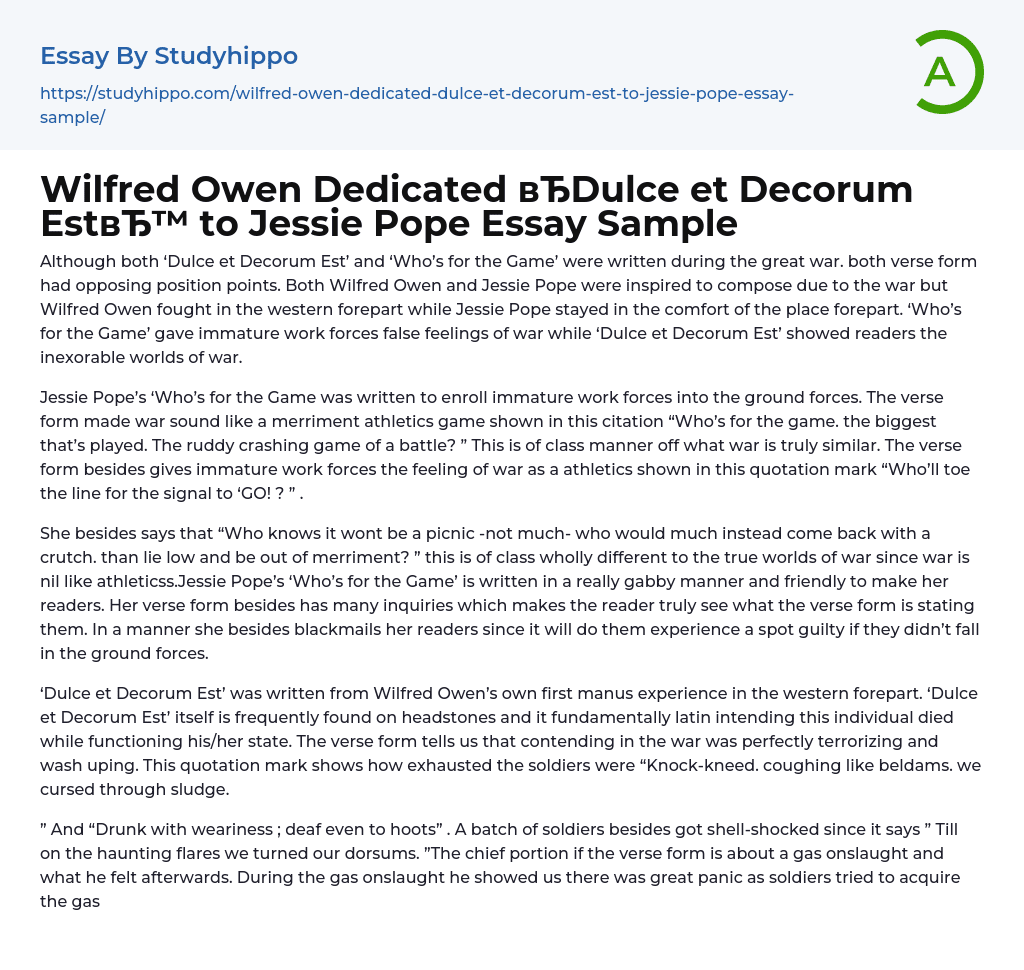

Wilfred Owen Dedicated “Dulce et Decorum Est to Jessie Pope Essay Sample
Despite both being written during the great war, ‘Dulce et Decorum Est’ and ‘Who’s for the Game’ took opposing positions. While both Wilfred Owen and Jessie Pope were inspired by the war, Owen fought in the western forefront, while Pope remained in the comfort of the home front. ‘Who’s for the Game’ falsely portrayed war to young men, whereas ‘Dulce et Decorum Est’ depicted the brutal realities of war to its readers.
Jessie Pope's 'Who's for the Game' aimed to recruit young men into the army by portraying war as an exciting sports game. This is evident in the line "Who's for the game, the biggest that's played, the red crashing game of a battle?" However, this representation of war is far from reality. The poem also creates an image of war as a competitive sport, as seen in the line "Who'll toe the l
...ine for the signal to 'GO!'?"
In her poem, "Who's for the Game," Jessie Pope utilizes a conversational tone to appeal to her readers and employs many questions to help them understand the poem. She also employs a bit of emotional manipulation by making the reader feel guilty if they do not join the army. However, her statement that war is nothing like sports demonstrates a complete disconnection from the realities of war.
'Dulce et Decorum Est', based on Wilfred Owen's personal experience in the western front, often appears on headstones and translates to "it is sweet and fitting to die for one's country" in Latin. The poem expresses the horrific and exhausting realities of war. This line highlights the soldiers' fatigue: "Knock-kneed, coughing like beldams, we cursed through sludge."
The poem describes th
chaos and fear experienced during a gas attack on soldiers. The line "Drunk with weariness; deaf even to hoots" highlights the overwhelming exhaustion and disorientation of the soldiers. Additionally, the stanza "Till on the haunting flares we turned our dorsums" suggests that even the bombardment of flares failed to fully prepare them for the gas attack. The majority of the poem focuses on the aftermath of the gas attack and the author's own emotional response. The quoted line "Gas! GAS! Quick. male child! -An rapture of groping" exemplifies the panic that ensued as soldiers struggled to put on their gas masks in time. Furthermore, it is mentioned that some soldiers became shell-shocked during the attack."
Suiting the awkward helmets just in time, Wilfred Owen vividly depicts the horrors of war in his poem 'Dulce et Decorum Est'. He describes a gas attack where he witnesses a young soldier's death, "But someone still was shouting out and stumbling and flound'ring like a man in fire or lime." The speaker also reflects on the lasting impact of war, revealing "In all my dreams before my helpless sight," that even in his dreams he sees a soldier similar to himself begging for help, yet unable to assist. Owen's graphic and descriptive style portrays the brutal reality of war. One particular line from the poem, "His hanging face," remains etched in the reader's mind.
Comparing the description of a dying soldier to a devil who has had enough of wicked deeds, it is noted that every movement causes blood to gurgle up from the lungs and mix with foamy saliva, resulting in a bitter taste. The graphic nature of the scene
is illustrated by the use of quotation marks in the statement, where blood and flesh pour out of the soldier's mouth.
In his poetry, the author portrays war as a devil consumed by wickedness and so distressing that even Satan would fall ill from it. The closing line of "Dulce et Decorum Est" is equally impactful, exposing the "old lie" and making the message unambiguous to readers. Wilfred Owen effectively reveals Jessie Pope's lack of understanding regarding war, with imagery in his poems outshining her calls to young men. Additionally, "Dulce et Decorum Est" stresses that war should never be trivialized as a mere game.
Upon analyzing both poems, 'Dulce et Decorum Est' resonated with me the most due to its authenticity (written by an actual soldier). It conveys the harsh reality of war and solidifies my belief that violence is unnecessary and cruel.
- Book Summary essays
- Metaphor essays
- Reader essays
- Rhyme essays
- Literary devices essays
- Villain essays
- Books essays
- Genre essays
- Literary Criticism essays
- Writer essays
- Protagonist essays
- Simile essays
- Poem essays
- Book Report essays
- Book Review essays
- Greek Mythology essays
- Plot essays
- Tragic Hero essays
- Coming of Age essays
- Play essays
- Rhetoric essays
- Rhetorical Question essays
- Translation essays
- Understanding essays
- Reason essays
- Character essays
- Letter essays
- American Literature essays
- Literature Review essays
- Utopia essays
- Poetry Analysis essays
- Dante's Inferno essays
- Between The World and Me essays
- Incidents in The Life of a Slave Girl essays
- Flowers for Algernon essays
- Myth essays
- Everyday Use essays
- Boo Radley essays
- Genesis essays
- Richard iii essays
- Alice in Wonderland essays
- On the road essays
- Ozymandias essays
- The Nightingale essays
- Holden Caulfield essays
- Animal Farm essays
- 1984 essays
- A Hanging essays
- Shooting An Elephant essays
- A Tale Of Two Cities essays



